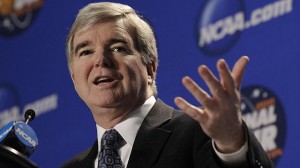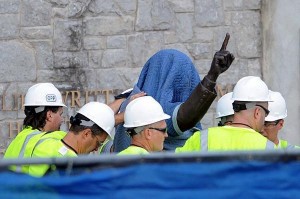Removing the Joe Paterno Statue Should Be Just The First Step For Penn State
During the recent debate about whether the statue of Joe Paterno outside Beaver Stadium at Penn State University should be removed, there have been passionate and legitimate arguments on both sides. Now that it has been made and the statue removed, my hope is that the decision represents a real willingness to change the culture of the school, rather than just another decision made to appease outside interests and to save face for a tarnished program.
Had the culture at Penn State been different over the last two decades it would not have changed the fact that Jerry Sandusky is a sick individual. However, if Paterno and other university leaders had been more concerned about doing the right thing and protecting innocent children, rather than protecting Sandusky and the reputations of the university and football program, the number of children whose lives were forever altered would be much smaller.
Since the story first became public in early November, it seems that most of the focus within the national media has been on the impact to Paterno, Penn State and the universities vaunted football program. I think one reason some believe the NCAA should levy harsh penalties against Penn State (which according to reports is going to happen as early as Monday) is that perhaps by punishing the football program it will help the university regain their perspective.
First off, I do not personally think the NCAA has any jurisdiction or legitimate reason to punish the Penn State football program. I do not believe that you can punish a program just because it has been given far greater magnitude to an athletic program than would seem logical. Heck, if you did that, then I think you could very much argue that any university that pays an athletic coach significantly more than the university president and spends more on athletics than on some academic programs could be lumped into that category.
[poll id=”227″]

Rather than working with the administration at Penn State to help craft a culture that puts athletics in the proper perspective, NCAA President Mark Emmert will instead place punitive sanctions on the program.
While the crimes of Sandusky are disgusting and indefensible, Penn State isn’t the only university that has chosen to protect individuals with value to their program rather than “do the right thing.” There have been many reports in recent years about colleges and universities allowing student-athletes who have had run-ins with the law to continue performing on the field. Now I’m not comparing petty theft or minor altercations to the crimes of Sandusky, but there have been many cases where athletes have had DUIs or been charged with a felony and have been able to return to the playing field without the NCAA questioning those decisions.
Rather than the NCAA sanctioning football at Penn State, I believe the only true chance for a lasting change in philosophy is for the university itself to take steps to forever change the culture.
Every college has the right to take pride in athletic success, but fans also have the right to legitimately expect that success is being achieved in a fair and proper manner. Even though the actions of Sandusky had no real impact on the success of the Penn State football team, the revelation that the football coach and school administrators valued that success more than they did doing the right thing has significantly tainted the taste of victory.
I believe that only people within Penn State can legitimately craft a future that will ensure that future success by the football team can be enjoyed with great pride by the legion of Penn State faithful.
Rather than placing sanctions on the football program, ensuring that pride could instead be achieved if the university that has long trumpeted a tradition of winning with honor would develop a set of criteria that ensure that in the future that is indeed true.
Even though some would see it as handcuffs for the program, if the university were to create a set of criteria that limited the ability of athletics to ever again control the institution it might serve as a long-term way to move past the recent events while also showing that a lesson has been learned.
Some parameters the university could implement include limiting the salaries for head and assistant coaches, enforcing university discipline on athletes, limiting construction of new athletic facilities to what is needed instead of continually building new state-of-the-art facilities to compete with everyone else and ensuring that all student-athletes attend regular classes and participate in programs as part of the total student body.
Taking those kinds of actions might be seen as some as putting the Penn State programs at a competitive disadvantage, but I would argue that if a series of actions that demonstrated that the college administration recognizes the true role of athletics within the University it would eventually be a positive for the school.
Imagine if Penn State was actually able to win football games without participating in the financial arms race that currently exists in big time college football? Now that would be a legacy worth protecting.
However, it is likely that instead of giving Penn State a chance to “do the right thing”, the NCAA is going to do the easy thing and punitively punish Penn State with bowl bans and scholarship reductions to a point where the football program will likely have little chance of being more than a bottom feeder for the next decade.
If the NCAA really cared about impacting change and punishing those that deserve punishing, then they would put “show cause” penalties on the former president and athletic director that would make it difficult for other schools to hire them. Then instead of banning Penn State from bowls and reducing scholarships they would work with the Penn State administration to create a model culture that could be followed by other schools to show that athletics can be competitive and successful while recognizing that it is a part of a greater university mission.
Of course, taking those types of steps could be seen as acknowledgement by the NCAA that big-time athletics all over the country have lost perspective of their true mission, so it will never happen. It is much easier and more comfortable to call this an isolated incident and resort to standard punishments than to acknowledge that what happened at Penn State is just the latest (and worst) example of athletics overstepping its level of importance on a university campus.
